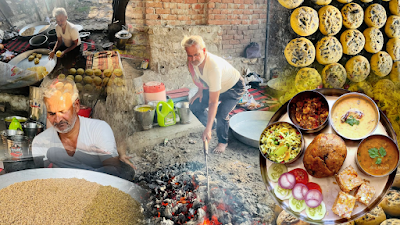Kachcha Khana from Kota-Bundi: Traditional Rajasthani Food Cooked on Cow Dung Cakes
Kachcha Khana from Kota-Bundi: Traditional Rajasthani Food Cooked on Cow Dung Cakes
कोटा-बूंदी का कच्चा खाना – उपले की आग पर पका देसी राजस्थानी भोजन
Introduction | परिचय
When people think of Rajasthan, forts and palaces often come to mind — but the real soul of this land lies in its rural food traditions.
राजस्थान का नाम सुनते ही किले और महलों की तस्वीरें ज़हन में आती हैं — लेकिन इस ज़मीन की असली पहचान है यहां का देसी खाना और रिवाज़।
One such age-old tradition still alive in Kota-Bundi is Kachcha Khana — food cooked on cow dung cakes (उपले), without modern gas or electricity.
कोटा और बूंदी के गांवों में आज भी एक पुरानी परंपरा ज़िंदा है – जिसे कहते हैं कच्चा खाना – जो कि बिना गैस, बिजली के सिर्फ उपलों की आग पर पकाया जाता है।
🕰️ The History of Kachcha Khana | कच्चा खाने का इतिहास
The word Kachcha Khana doesn’t mean raw food. It means food prepared in the most traditional, natural way — using mud chulhas, cow dung cakes, and no machines.
कच्चा खाना का मतलब अधपका खाना नहीं, बल्कि वो खाना है जो चूल्हे और उपलों की आग पर बिना किसी मशीन या गैस के बनाया जाता है।
This method has been passed down for centuries, especially used in fairs, poojas, and family events.
यह परंपरा पीढ़ियों से चली आ रही है, और आज भी मेलों, त्योहारों, और पारिवारिक कार्यक्रमों में निभाई जाती है।
🔥 Cooking Kat Baati on Cow Dung Cakes | उपलों पर पकने वाली कट बाटी
One of the most iconic dishes in this tradition is Kat Baati – a rustic version of Rajasthani Baati.
इस देसी खाने की सबसे खास डिश है कट बाटी – जो की बाटी का देहाती रूप है।
How it's made | बनाने की विधि:
-
Dough made with whole wheat, ghee & salt
-
Flattened into discs and placed on hot cow dung cakes
-
Cooked directly on ash and flame
-
Finally dipped in ghee and served with dal & churma
-
The smoky flavor is impossible to recreate in modern ovens
विधि:
-
गेहूं के आटे में नमक और घी डालकर लोई तैयार की जाती है
-
इस लोई को दबाकर उपलों की आग में सीधा पकाया जाता है
-
पकने के बाद इसे देसी घी में डुबोकर दाल-चूरमे के साथ परोसा जाता है
-
इसका स्मोकी देसी स्वाद किसी गैस पर नहीं मिल सकता
😋 The Taste & Experience | स्वाद और अनुभव
The first bite gives you a crispy, smoky crust, soft center soaked in ghee, and when paired with hot dal — it’s divine.
पहला निवाला लेते ही मिलता है स्मोक से भरा कुरकुरा क्रस्ट, अंदर से नरम और घी में डूबा स्वाद – और जब गरमा गरम दाल साथ हो, तो बात ही कुछ और है।
More than just a meal, it’s about:
-
Cooking in the open air
-
Sitting on the ground with others
-
Sharing food like a family
ये सिर्फ खाना नहीं, बल्कि एक संस्कृति है:
-
खुले में चूल्हा जलाना
-
ज़मीन पर बैठकर साथ खाना
-
परिवार और गांव के साथ मिलकर भोजन बांटना
It’s food that connects you to earth, people, and tradition.
ये भोजन आपको मिट्टी, इंसान और परंपरा से जोड़ता है।
📍 Why You Should Try It | क्यों ज़रूर चखना चाहिए?
✅ Authentic Flavor – Only firewood and love can create this.
✅ Cultural Immersion – It’s not just a dish, it’s an experience.
✅ Eco-Friendly – No electricity, gas, or pollution.
✅ Rural Connection – Feel the simplicity of India’s heartland.
✅ असली स्वाद – जो सिर्फ आग और प्यार से आता है
✅ संस्कृति से जुड़ाव – ये सिर्फ खाना नहीं, एक अनुभव है
✅ पर्यावरण के अनुकूल – ना गैस, ना बिजली, ना धुआं
✅ गांव की मिट्टी से रिश्ता – भारत की असली सादगी को महसूस करें
🎥 Watch the Experience | पूरा अनुभव वीडियो में देखें
Want to see how this is done? Watch my vlog filmed in the village of Bundi.
क्या आप देखना चाहते हैं कि ये खाना कैसे बनता है? तो मेरा ये व्लॉग ज़रूर देखें।
📺 Watch now on YouTube
📌 Location: Rural areas of Kota-Bundi, Rajasthan
📝 Conclusion | निष्कर्ष
Kachcha Khana is not just a recipe — it’s a story of our ancestors, our soil, and our soul.
कच्चा खाना सिर्फ एक रेसिपी नहीं – ये हमारी जड़ों, हमारी मिट्टी और हमारी आत्मा की कहानी है।
If you ever visit Rajasthan, skip the restaurant for a day. Go to a village, sit beside the chulha, and eat a meal made with hands, hearts, and history.
अगर आप राजस्थान जाएं, तो एक दिन किसी गांव में जाएं – चूल्हे के पास बैठकर, हाथों से बना, दिल से परोसा और परंपरा से भरा खाना खाएं।

%20(1).jpeg)

Comments
Post a Comment
"Please share your thoughts in the comments below! Do not post spam or offensive language. Thank you!"